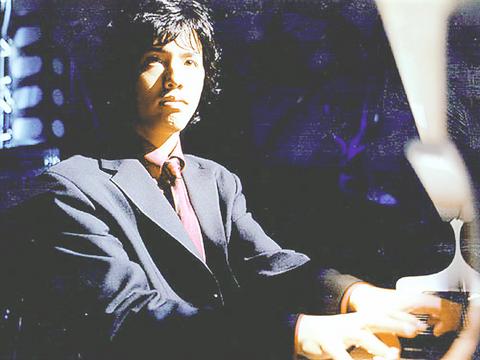Ask any astute Taiwanese observer of the local classical music scene why all the tickets are sold for Yundi Li's Taipei concert on Sunday and you will get the reply: "Because he's Chinese."
Yundi Li, still only 20, rocketed to the attention of audiences and CD buyers in Europe and Asia following his sensational winning of Warsaw's Chopin Competition, the first time its top prize had been awarded to anyone in 15 years. His first CD Yundi Li: Chopin sold exceptionally well, and has been followed by Yundi Li: Liszt and two others, one issued in Japan. And he has still to make his debut, live or on disc, in the US.
The fact that he's Chinese may influence some ticket-buyers, overjoyed to see someone of his ethnicity beat the foreigners at what could be perceived as their own game. Nevertheless, there have been many before him, and in every department of classical virtuosity. This week alone has seen several such in Taipei for Lin Cho-liang's International Music Festival, but the loudest applause at last Monday's concert was for Gil Shaham and Lynn Harrell, notably non-Chinese musical stars.

PHOTO COURTESY OF MNA
Another element in Yundi Li's phenomenal success may be his youthful good looks, plus the way these have been used by Deutsche Grammophon in promoting his recordings.
Nevertheless, the heart of the matter is that Yundi Li is an outstanding artist in his own right. His Liszt CD is brilliant in every way, combining the utmost delicacy with total interpretative authority and, where necessary, power. All the indications are that here is a major international pianist, supremely talented by any standards, with a long career ahead of him.
His three Taiwan concerts will feature Chopin's four Scherzos, followed by the arduous Sonata in B Minor of Liszt which opens his Yundi Li: Liszt CD.
This is a rather uncompromising program, to put it mildly. Chopin's scherzos (he only wrote these four) are not like what most listeners will expect from this composer. And the Liszt sonata is bravura stuff, but hardly familiar to non-specialists.
Yundi Li, in other words, is making no allowances for popular taste, but instead assaulting some very difficult music head-on. There can be little doubt, however, that there will be encore items at the end, and these are likely to be of more familiar material.
Sunday's concert in Taipei is sold out, but tickets from NT$800 to NT$1,500 were available for Tuesday's concert in Kaohsiung and Thursday's in Taichung as of press time.
Yundi Li will perform at the National Concert Hall, Taipei on Sunday at 7.45pm; at Chihte Hall, Kaohsiung, 25 March, 7.30pm, and at Chunghsing Hall, Taichung, 27 March, 7.30pm. Tickets are available through ERA ticketing.

A vaccine to fight dementia? It turns out there may already be one — shots that prevent painful shingles also appear to protect aging brains. A new study found shingles vaccination cut older adults’ risk of developing dementia over the next seven years by 20 percent. The research, published Wednesday in the journal Nature, is part of growing understanding about how many factors influence brain health as we age — and what we can do about it. “It’s a very robust finding,” said lead researcher Pascal Geldsetzer of Stanford University. And “women seem to benefit more,” important as they’re at higher risk of

March 31 to April 6 On May 13, 1950, National Taiwan University Hospital otolaryngologist Su You-peng (蘇友鵬) was summoned to the director’s office. He thought someone had complained about him practicing the violin at night, but when he entered the room, he knew something was terribly wrong. He saw several burly men who appeared to be government secret agents, and three other resident doctors: internist Hsu Chiang (許強), dermatologist Hu Pao-chen (胡寶珍) and ophthalmologist Hu Hsin-lin (胡鑫麟). They were handcuffed, herded onto two jeeps and taken to the Secrecy Bureau (保密局) for questioning. Su was still in his doctor’s robes at

Last week the Democratic Progressive Party (DPP) said that the budget cuts voted for by the China-aligned parties in the legislature, are intended to force the DPP to hike electricity rates. The public would then blame it for the rate hike. It’s fairly clear that the first part of that is correct. Slashing the budget of state-run Taiwan Power Co (Taipower, 台電) is a move intended to cause discontent with the DPP when electricity rates go up. Taipower’s debt, NT$422.9 billion (US$12.78 billion), is one of the numerous permanent crises created by the nation’s construction-industrial state and the developmentalist mentality it

Experts say that the devastating earthquake in Myanmar on Friday was likely the strongest to hit the country in decades, with disaster modeling suggesting thousands could be dead. Automatic assessments from the US Geological Survey (USGS) said the shallow 7.7-magnitude quake northwest of the central Myanmar city of Sagaing triggered a red alert for shaking-related fatalities and economic losses. “High casualties and extensive damage are probable and the disaster is likely widespread,” it said, locating the epicentre near the central Myanmar city of Mandalay, home to more than a million people. Myanmar’s ruling junta said on Saturday morning that the number killed had